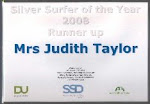 Identity theft is something we are becoming increasingly aware of, but here is an aspect of it which had not entered my mind until I read a magazine article this morning. I am going to reproduce it here because it sounds sensible to me.
Identity theft is something we are becoming increasingly aware of, but here is an aspect of it which had not entered my mind until I read a magazine article this morning. I am going to reproduce it here because it sounds sensible to me.You can help protect a deceased relative or friend’s identity by taking some simple precautions:
[1] If you place an obituary notice in a newspaper don’t include details such as age, date of birth, maiden name or address. These can provide criminals with the initial information they need to commit the fraud.
[2] Ensure that all relevant organisations are informed of the death.
[3] Contact the Royal Mail to have mail redirected to you or another responsible person. Also check with the Royal Mail that a redirection has not already been put in place, another favourite of fraudsters when trying to obtain the deceased’s information.
[4] If you take clothing or other belongings to charity shops ensure that all personal documents are removed from pockets, wallets or handbags.
[5] If you use a house clearance company also ensure that any documents are removed. Check drawers, wardrobes and any other areas where documents may have been stored.
[6] Any correspondence which is not required and which contains any personal details should be shredded or burned and not placed intact in refuse bins. This not only applies to bank statements or official communications but to all personally addressed mail. A simple personalised gift catalogue (eg with your personal account number on it), for example, could provide sufficient information for a fraudster.
[7] If the deceased’s home is left unoccupied make sure that the house is checked regularly and that all mail is removed.
[8] If the house is put on to the property market, ask the estate agent not to include ‘vacant possession’ in advertising literature and ensure that all viewings are accompanied.
[9] Register the deceased’s details with the Deceased Preference Service:
[0800 068 44 33 or www.deceasedpreferenceservice.co.uk . This is a completely free consumer service which allows relatives or friends to register the details of a deceased person online, by freephone or freepost. The details are passed on to reputable organisations who use the information to stop unsolicited mail and for fraud prevention purposes. The data is also used by the major credit reference agencies to ensure that any credit applications made in the name of a deceased person are detected and prevented. Both recent deaths and those which occurred in the past may be registered.
[Active Life Magazine - January/February 2007]
[10] Be sure to remove the deceased relative's name from all joint accounts. Finally, contact the credit reporting agencies and request a 'deceased alert'. This places a notice on the deceased's credit report, telling companies that the person has died and cannot be issued credit. [From the web]




3 comments:
Isn't stealing a dead person's identity the ultimate victimless crime?
(Actually, I think this is a great idea and didn't realize this type of identity-theft was possible and think any steps that can be taken to prevent it are good).
I'm not sure about that - you might end up doing some damage to the deceased's family and heirs, emotionally if not financially.
OH J, nothing seems safe anymore does it?
Thanks for the info.
Post a Comment